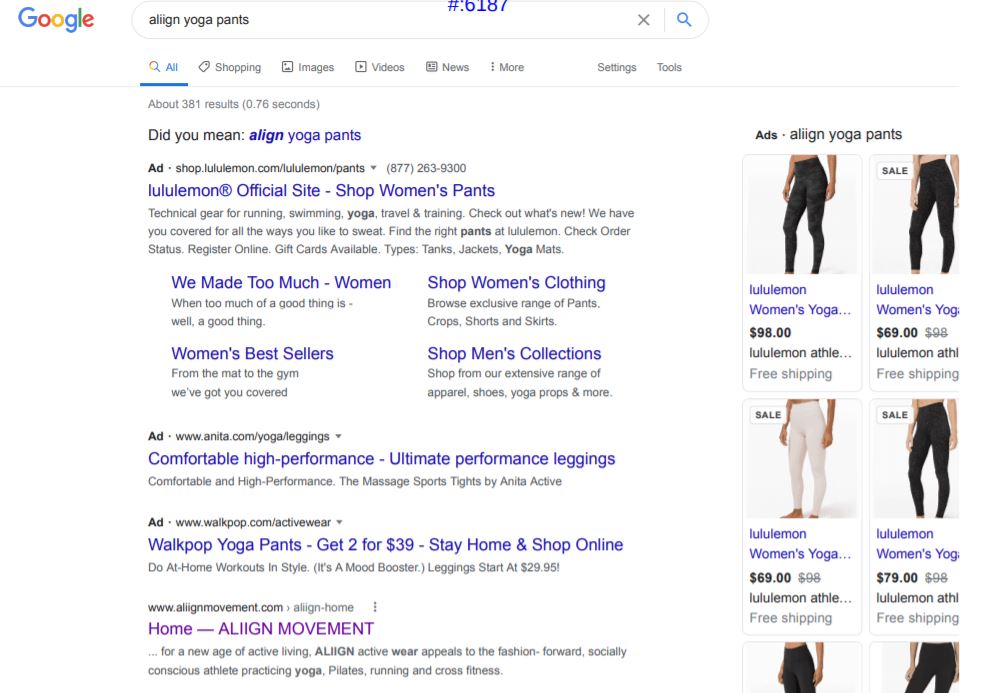Lululemon has prevailed in a trademark lawsuit waged against it by a Los Angeles-based lifestyle brand, which was seeking damages “in excess of $20 million” from the athleisure giant. According to a complaint (and subsequent amended complaints) that it lodged with a California federal court in April 2020, Aliign Activation Wear (“AAW”) claimed that Lululemon is on the hook for “willfully infringing … [its] Aliign trademark,” which the company said it has been using since 2011. That is at least 5 years before its larger rival rolled out a collection of its own “Align” wares, and years before it filed a handful of trademark applications for registration for the mark, all of which were “rejected … in part [due] to a likelihood of confusion with [AAW’s existing] registration for ALIIGN” for use in connection with athletic apparel, bags, and yoga mats.
On the heels of the U.S. District Court for the Central District of California denying AA’s motions for summary judgment on the basis that “no reasonable juror could find a likelihood of forward confusion, reverse confusion, or initial interest confusion,” AAW lodged an appeal with the U.S. Court of Appeals for the Ninth Circuit – and this week, was handed another loss.
In a memo dated August 9, a panel of judges for the Ninth Circuit sided with Lululemon, affirming the district court’s determination on all three theories of confusion. Applying the factors from AMF Inc. v. Sleekcraft Boats to determine whether there is a likelihood of reverse confusion at play, the Ninth Circuit stated that “several factors lead us to conclude that AAW failed to raise a triable issue of fact as to whether reasonably prudent consumers encountering AAW’s goods will likely believe that those goods are manufactured or sponsored by lululemon.” (The Sleekcraft factors consist of: (1) strength of the mark(s); (2) proximity or relatedness of the goods; (3) similarity of the marks; (4) evidence of actual confusion; (5) marketing channels; (6) degree of consumer care; (7) the defendants’ intent; and (8) likelihood of expansion.)
“The most significant factor in this case,” according to the federal appeals court, is “the way the companies’ respective products are marketed to and encountered by consumers.” Specifically, Lululemon “primarily sells its Align yoga pants through its own website and brick-and-mortar stores, with limited sales in select yoga studios.” Meanwhile, the court notes that AAW sells its products primarily through its own website and had limited distribution in Urban Outfitters in 2014. “The near absence of any overlap in marketing or distribution channels weighs heavily against a finding that reverse confusion is likely here,” the court states. And the fact that both companies “use the Internet generally as a marketing channel ‘does not shed much light on the likelihood of consumer confusion,’” the court holds, citing an earlier decision from the same circuit.
Further lessening the likelihood of confusion is the fact that Lululemon’s Align pants are sold bearing “either the dominant and distinctive Lululemon house mark or the company name.”
Several other Sleekcraft factors weigh in Lululemon’s favor, as well, the court notes, stating that there is no indication that Lululemon intended to infringe AAW’s mark “or even that Lululemon was aware of AAW’s mark when the alleged infringement began.” Beyond that, the court states that the absence of evidence of actual confusion, despite both parties having used their marks for years, “indicates that reverse confusion is unlikely.”
And still yet, the court points to the prices of both companies’ yoga products, which are “far more expensive than other yoga products,” thereby, reducing the chance of confusion, as “one would expect that consumers would exercise a high level of care before purchasing anything from Aliign or lululemon.” That level of care “reduces any likelihood of confusion,” the court asserts.
With its lack of likelihood of reverse confusion at mind, the judges held that there is similarly no likelihood of forward confusion given that they both rely on the same analysis of the Sleekcraft factors. As such, the court held that “no reasonable consumer is likely to believe that AAW is somehow the source or sponsor of Lululemon’s products.”

Finally, the court turns its attention to AAW’s initial interest confusion theory, stating that “because AAW focuses its arguments on appeal on initial interest confusion among Internet shoppers, it must demonstrate that ‘a reasonably prudent consumer accustomed to shopping online’ would be confused by the Google results AAW relies upon.” (AAW previously argued that consumers who search for “aliign pants” or “aliign yoga pants” on Google are provided with results for “align” pants,” which are clearly labeled as goods originating from Lululemon.)
Given that the search results include “unambiguous labeling” – including the standard Google prompt that asks the searching party if he/she meant to search for “align” – that serves to “significantly reduce any confusion for the prudent consumer,” the court contends. At the same time, “The page also informs consumers that it is providing results with the word ‘align,’ and allows consumers to search specifically for results with the word ‘aliign’ if they wish.” It is “highly unlikely,” according to the court, that “any consumer searching for AAW’s products would be confused as to the source of the goods he or she encounters in search results given these circumstances.”
This line of reasoning about the sophistication of e-commerce shoppers mirrors that of Judge Kevin Castel of the U.S. District Court for the Southern District of New York who held in a recent trademark case – which 1-800-Contacts waged against Warby Parker that partially involved keyword advertising – that the “reasonable consumer” is relatively sophisticated when it comes to “conducting internet searches in the year 2022.” In that case, the court stated that consumers were not likely to be confused about Warby Parker’s use of competitive keyword ads, as they “would likely be familiar with both the concept of paid search results and the significance of website address links.
As for the outcome of the case at hand, Leason Ellis’ Martin Schwimmer says that it can be filed alongside the decision of the U.S. Court of Appeals for the Second Circuit in RiseandShine Corporation v. PepsiCo, Inc. as the latest example of “brands with strong housemarks defeat[ing] reverse confusion claims.”
The Ninth Circuit’s decision comes on the heels of the Second Circuit issuing its decision in RiseandShine last month., reversing a preliminary injunction entered by the U.S. District Court for the Southern District of New York that would have barred PepsiCo from marketing its “Mtn DEW Rise Energy” energy drink, taking issue with the merits of Rise Brewing’s reverse confusion theory. Among other things, the Second Circuit disagreed with the lower court in terms of the strength of Rise Brewing’s mark, finding that links between the word “Rise” and coffee make it a suggestive mark entitled to a narrow scope of protection. Additionally, the appeals court agreed with PepsiCo, which argued that “where a plaintiff claims it will be the victim of reverse confusion – in that consumers will believe that its product comes from the junior user – a plaintiff’s showing of acquired strength of its mark does not support its claim.”
The case is Aliign Activation Wear, LLC v. Lululemon athletica inc., 2:20-cv-03339 (C.D. Cal.).











